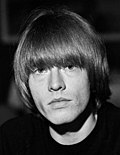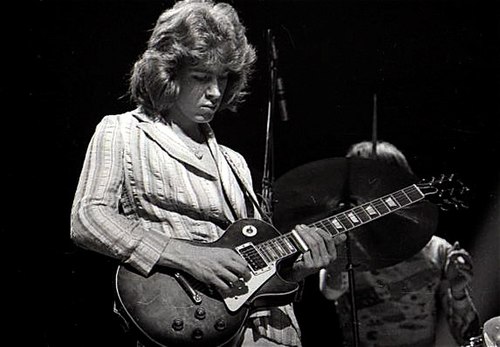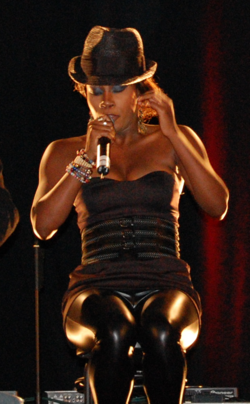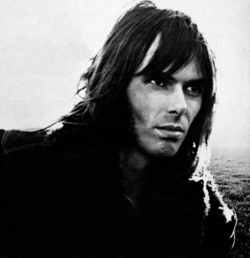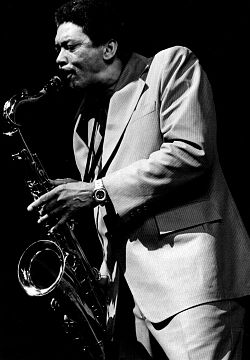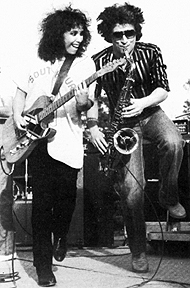History
Jagger and Richards first met when they became classmates in 1950 at Dartford, Kent. [1] [2] When Jagger's family moved to Wilmington, Kent in 1954, Jagger formed a garage band with his friend Dick Taylor, who would later be an early bassist for the band. Jagger next met Richards on 17 October 1961 on platform two of Dartford railway station, [4] when they realised they had a shared musical interest, they formed a musical partnership. Richards and Taylor often met Jagger at his house. The meetings moved to Taylor's house in late 1961, where Alan Etherington and Bob Beckwith joined the trio; the quintet called themselves the Blues Boys. The Blues Boys sent a tape of their best recordings to Alexis Korner, who was impressed. On 7 April, they visited the Ealing Jazz Club, where they met the members of Blues Incorporated, who included slide guitarist Brian Jones, keyboardist Ian Stewart, and drummer Charlie Watts. After a meeting with Korner, Jagger and Richards started jamming with the group.
Having left Blues Incorporated, Jones advertised for bandmates in Jazz Weekly in the week of 2 May 1962. [7] Ian Stewart was among the first to respond to the ad. [7] In June, Jagger, Taylor, and Richards left Blues Incorporated to join Jones and Stewart. [7] That same month, the addition of the drummer Tony Chapman, replacing temporary drummer Mick Avory. [8] [9] completed the line-up of Jagger (vocals), Richards (guitar), Jones (guitar), Stewart (piano), and Taylor (bass).
The band played their first show billed as "the Rollin' Stones" on 12 July 1962, at the Marquee Club in London. [10] [12] At the time, the band consisted of Jones, Jagger, Richards, Stewart, and Taylor. [13] Bill Wyman auditioned for the role of bass guitarist at a pub in Chelsea on 7 December 1962 and was hired as a successor to Dick Taylor, [14] after Colin Golding [15] and Ricky Fenson [16] had stints with the band. Chapman, who had brought Wyman into the band, left the line-up and was replaced by Carlo Little before Charlie Watts completed the classic line-up of the Rolling Stones, who played for the first time in public on Saturday, 12 January 1963, at the Ealing Jazz Club. However, it was not until a gig there on 2 February 1963 that Watts became the Stones' permanent drummer. [18]
In May 1963, the Rolling Stones signed Andrew Loog Oldham as their manager. [19] Stewart left the official line-up, due to not matching the band's image, "being too old" and six being too many members. Stewart remained the road manager and touring keyboardist. [20] This line-up remained stable until June 1969, when Jones was fired due to his heavy drug use which limited his contributions in the studio and made him unable to obtain a US visa for touring, On 3 July 1969, less than a month later, Jones drowned under mysterious circumstances in the swimming pool at his home, Cotchford Farm, in Hartfield, East Sussex. The band auditioned several guitarists, including Paul Kossoff, [23] as a replacement for Jones, before settling on Mick Taylor, who was recommended to Jagger by John Mayall. [24]
The Rolling Stones were scheduled to play at a free concert for Blackhill Enterprises in London's Hyde Park, two days after Jones' death; they decided to go ahead with the show as a tribute to him. [25] This was Taylor's first live performance with the band. [26] Taylor's first album with the band was Let It Bleed in late 1969, [27] with posthumous contributions from Jones.
For the band's 1970 European Tour, they were joined by Bobby Keys on saxophone [28] and Jim Price on trumpet and trombone. [29] For their 1971 UK tour they were joined by pianist Nicky Hopkins, [30] who took over duties from Stewart temporarily, though he later returned for the bands 1972 American tour, playing on select songs. After the band's Pacific tour 1973, Price and Hopkins departed the touring band. For the European tour, the band was joined by Steve Madaio on trumpet and flugelhorn, [31] Billy Preston on keyboards and vocals, Trevor Lawrence on saxophone. Manuel Kellough (percussion) [32] and Marshall Chess (trumpet) also joined the band for certain dates. Keys departed on 30 September 1973, to clean up from drink and drugs. [33] This tour was also the last for Taylor before he quit at the end of 1974, due to him not feeling like he fit in. [35]
The band auditioned several guitarists to replace Taylor, including Peter Frampton, Jeff Beck, Robert A. Johnson, Shuggie Otis and Rory Gallagher. Black and Blue session contributors Wayne Perkins and Harvey Mandel also auditioned but were not successful. The band later settled on Ronnie Wood. For the band's Tour of the Americas '75, they were joined by the returning Preston and Stewart alongside percussionist Ollie E. Brown, [37] These musicians also joined the band for their Tour of Europe '76.
For the band's US Tour 1978, they were joined by Stewart and Ian McLagan (who had played with Wood in Faces). [38] These two musicians stayed for the band's American Tour 1981, alongside saxophonist Lee Allen who was replaced by Ernie Watts and the returning Bobby Keys. [39] McLagan was replaced by Chuck Leavell for the European Tour 1982, as well as second saxophonist Gene Barge, [40] It was also the last tour for Ian Stewart who died in December 1985. [41]
The band did not tour again until 1989, when they embarked on the Steel Wheels/Urban Jungle Tour, which ran until 1990. The tour included an extended touring band with Leavell and Keys returning, and new members second keyboardist Matt Clifford, backing vocalist Bernard Fowler and the Uptown Horns (Arno Hecht (saxophone), Bob Funk (trombone), Crispin Ciole (saxophone) and Paul Litteral (trumpet). For the North America and Japanese legs; they were joined by backing vocalists Lisa Fischer, Cindy Mizelle and Pamela Quinlan, and Lorelei McBroom and Sophia Jones for the European tour. [42] This tour was their last with Wyman who left the band in January 1993. [43] Wyman was not officially replaced.
For the band's Bridges to Babylon Tour in 1997, the tour band included the returning Leavell, Keys, Fowler, and Fischer, as well as new members Darryl Jones (bass), Andy Snitzer (saxophone, keyboards), Michael Davis (trombone), Kent Smith (trumpet) and Blondie Chaplin (backing vocals, percussion, guitar). [44] The same musicians, except Snitzer who was replaced by Tim Ries, played on all tours from the No Security Tour in 1999, to the A Bigger Bang Tour from 2005 to 2007. Following the end of the tour in 2007, Chaplin departed. The band did not tour again until 2012, with Matt Clifford rejoining. The tour also included many guests, including former members Bill Wyman and Mick Taylor. [45] Taylor continued to make appearances on the 14 On Fire in 2014, it was also the last tour of Bobby Keys who was replaced by Karl Denson for dates in October and November [46] before Keys' death in December. [47] Fischer departed after the Zip Code tour in 2015, [48] and was replaced by Sasha Allen. [49]
In 2017, the band embarked on the No Filter Tour with the same touring band; this tour continued until 2019, after which shows in 2020 were postponed due to the coronavirus pandemic. [50] Dates were rescheduled to September 2021, and were the first since 1963, without Charlie Watts who had to undergo a medical procedure [51] and died before the final leg of the tour. [52] The band confirmed on 26 August that the tour would continue as planned, [53] with Steve Jordan taking his place in the line-up for the remainder of the tour. [54] [55]
Jordan continued to drum with the band for the Sixty Tour, which included the same band, with Sasha Allen being replaced by Chanel Haynes on 21 June 2022. [56]









